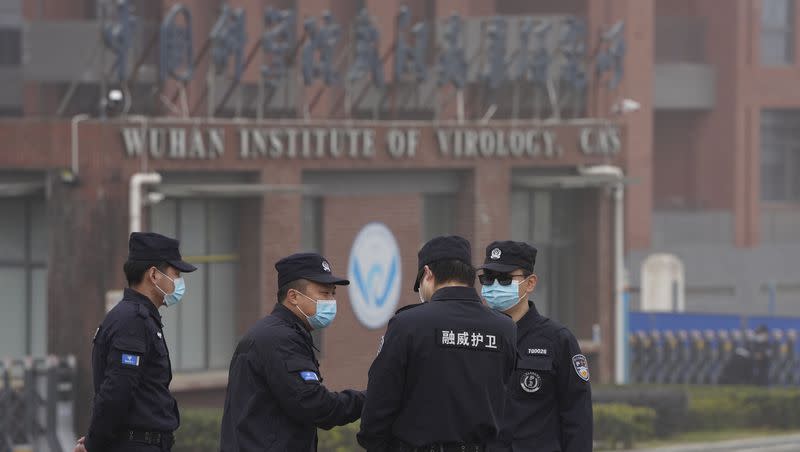Opinion: Release the COVID-19 intelligence

- Oops!Something went wrong.Please try again later.
In a recent clip featuring Dr. Anthony Fauci, CNN described the theory that COVID-19 emerged because of work in a lab as a “minority view.”
But, in fact, more than two-thirds of Americans say it is “definitely” or “probably true” that the virus originated in a lab, according to a recent Economist/YouGov poll, and that includes majorities of both Democrats (53%) and Republicans (85%).
While the poll did not distinguish between people who believe the virus was intentionally created or “naturally mutated” within a lab, this theory of the origins of COVID-19, once dismissed as an idea held by conspiracy theorists, has become a rare area of agreement across party lines. Both the U.S. House and Senate voted unanimously to require the Biden administration to declassify intelligence gathered on the matter.
The administration has yet to comply, and President Joe Biden has not said whether he will veto the bill, even though administration officials considered a lab leak from the Wuhan Institute of Virology plausible as far back as the summer of 2021 and both the Energy Department and the FBI believe the virus emerged from the Wuhan lab.
So why the delay?
On one hand, it’s understandable why Biden is hesitant to let these particular bats out of the belfry.
The president is encircled with a constellation of problems involving China, to include the spy balloon he ordered shot down last month, the impending meeting of Xi Jinping and Vladimir Putin, rising tension over Taiwan, and now, reports that Biden family members and associates received $3 million from a Chinese company. Whatever is contained in that intelligence is sure to add another geopolitical headache. The assessment of Utah Rep. Chris Stewart increasingly seems right: that the U.S. is “afraid of confronting China.”
But the controversy isn’t going away, despite the administration’s best efforts to ignore it, or to direct attention to a new report that tries to vindicate bats and implicate illegally sold raccoon dogs. Nor should it.
Related
The origins of COVID-19 matter. Whether the cause is ultimately determined to be the most sinister posited (bioweapons) or the most benign (accidental animal transmission), we all have an interest in learning from what went wrong to try and prevent a future pandemic. No one should be punished for asking questions when public health is on the line.
But that’s exactly what happened over the course of the pandemic to skeptics of the prevailing narrative, which included not only Kentucky Republican Sen. Rand Paul, but also Democrats like California Rep. Ro Khanna.
Writing for New York Magazine’s Intelligencer, James D. Walsh aptly described what happened: “Not long ago, people who suggested that researchers might have accidentally unleashed the virus were written off as kooks or China hawks, which confined much of the early public discussion of the lab-leak theory to the fun houses of the far right.”
The politicalization of the origins of Covid occurred in part because then-President Donald Trump was quick to assign blame. Before long, Americans were divided into two camps: you were either pro-Trump or pro-Fauci, when we all should have simply been pro-truth.
Now, after a long and strange journey during which Fauci has gone from the most popular scientist in America to a man some people say should be in prison, it appears that many Americans — and all of Congress — are, in fact, pro-truth. We’d like to know just what our government knows after three years and more than a million deaths, and whether or not the information aligns with our existing opinions.
This makes it all the more curious that Biden has yet to act on declassifying intelligence about COVID-19 a week after the bill passed the House, or to speak on it in any meaningful way.
Fauci, meanwhile, did himself no favors with an analogy about how COVID-19 could have both arisen in the wild in bats and escaped from a lab, even while saying that he maintains a “completely open mind” about the virus’ origins.
Dr. Fauci is now arguing maybe someone got infected by a Chinese bat and was being studied in a lab and that’s how we got covid. He’s increasingly flailing in all public appearances. Charge him with lying to Congress and put him in prison: pic.twitter.com/AOETkYVFUv
— Clay Travis (@ClayTravis) March 13, 2023
It’s possible — maybe even likely — that we will never know with certainty what events precipitated the COVID-19 pandemic; we still don’t know for sure what caused the flu pandemic of 1918. That doesn’t mean we should stop asking questions — but it does mean we shouldn’t vilify people who do.
And the question right now is, when will the president sign that bill?
Its corollary — what’s stopping him? — would be nice to know, too.

